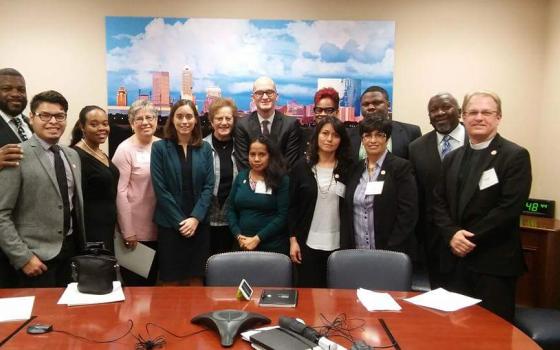The past month has been a time of questions. In my ministry as a community organizer, I meet daily with folks who are asking questions about how the recent election will impact them: "Will my family be separated? How can our church provide a safe place for our people? How can my children feel safe in their black bodies?" I get on conference calls with organizers across the country who are asking questions about how to respond in this time of confusion: "How can we meet lay leaders in the reality of their fear and call them into restorative action? How can we draw clergy out of comfortable apathy?"
The questions swirling in my head were recently met with a question Fr. Chris Wadelton posed to parishioners at St. Philip Neri Catholic Church on the near-east side of Indianapolis: "What have we done?" Father Chris had traveled to South Africa this fall with a pastoral leadership program to study and reflect on the anti-apartheid movement. He shared the song "Senzeni Na?" ("What Have We Done?") with us to open a session sharing his learnings. This Xhosa/Zulu anti-apartheid folk song has been sung for decades in South Africa and gained popularity across the world as a song lamenting the destruction caused by racism and war. It implies, "What did we do to deserve this?" and continues,
Our sin is that we are black.
Our sin is the truth
They are killing us
Let Africa return.
Father Chris mentioned that some in South Africa now reframe and reclaim this question as a way to call themselves into responsibility: "What have we done to dismantle racism?" "What have we done to show the power of non-violent resistance?"
The question struck me as I lament the choices U.S. citizens made on November 8 and continue to make out of fear of whomever we might label as "other." As I listened to the repeated refrain, "Senzeni Na," the question, "What have we done?" lived within me as a real lament, a deep sorrow and fear for immigrants, refugees, Muslims, and our black and brown and LGBTQ brothers and sisters. "What have we done?"
But at IndyCAN's Leadership Assembly last week, I began to personally reclaim this question. During the interfaith gathering of 100 lay leaders and clergy, I was drawn back to what we, as people of faith, have done these weeks and months to flip the narrative of exclusion and oppression. We celebrated volunteers who hosted phone banks five nights a week for 12 weeks to reach out to marginalized voters. We celebrated those among us who had offered water and umbrellas to voters who persisted for hours in the rain on Election Day to make their voices heard despite clear attempts at voter suppression. We recognized that we had reached tens of thousands of citizens ignored by traditional campaigns due to the fact they were expected not to show up at the polls. We applauded our delegation of faith leaders who had just returned from D.C. where they shared their stories with legislators and asked that the abundance of God be made available to all. What had we done? We had persisted for the sake of racial and economic equality.
Advent questions
The tension that exists in the question "What have we done?" reminds me in these Advent days of another loaded question asked centuries ago by a young, unwedded woman in Nazareth who was just informed she'd be giving birth to a child: "How can this be?" I have always appreciated Mary's audacity in asking this question. Often depicted as docile and obedient, Mary in this moment comes to us as a woman unafraid to expose her initial interior resistance. I sense in her words, beyond a reasonable sense of shock and confusion, a deep desire to understand what is being asked of her.
As I work to reclaim my own questions, I wonder if Mary's question might be reframed as her way of asking the Holy One what it would actually take for her to bear the presence of God: "How can I participate in this act of co-creation? What will it take for this to come to birth in me? Can you show me how?"
As a mission novice still grappling with what it means to bring community life and ministerial life into some semblance of balance, I resonate on a number of levels with Mary's question about the call of the present moment: "How can this be?" In these days and weeks of confusion, I cling to her model of persistence amidst seemingly impossible circumstances. Moving with people of faith into an uncertain political landscape, I find myself shifting in my prayer from lament, shock and disbelief to seeking an understanding of the Gospel response that is growing within me: "What will it take for this to come to birth in me? Can you show me how?"
Praying with Mary and with the image of the Word made flesh these days, I am deeply grateful for the liturgical seasons that always seem to meet me where I am. The questions continue without clear answers, but that does not keep me from asking them or believing that they are, in fact, already being answered in my midst. With a faint but real ray of Advent hope, my, "How can this be?" meets the spirit's whisper, "It is already becoming."
[Tracey Horan is a mission novice with the Sisters of Providence of Saint Mary-of-the-Woods, Indiana. Her first deep conversation with a Sister of Providence occurred in a melon patch during her time as an intern at the Sisters' White Violet Center for Eco-Justice. She hopes to channel the spirit of her heroine Dorothy Day in her new ministry as a community organizer with Indianapolis Congregation Action Network (IndyCAN).]

